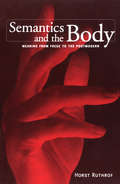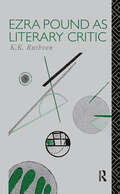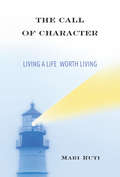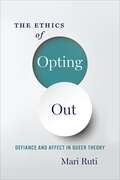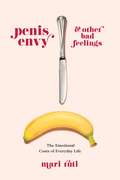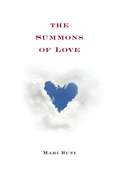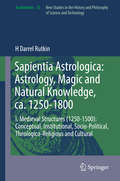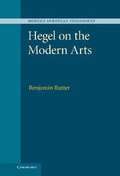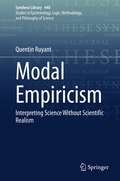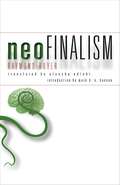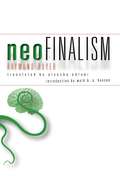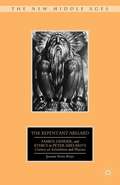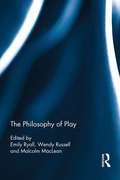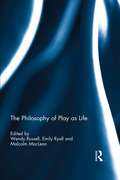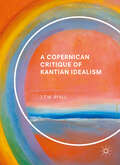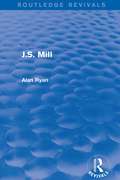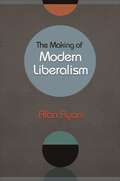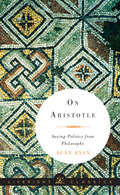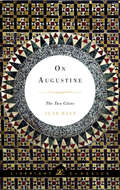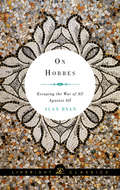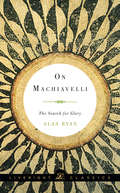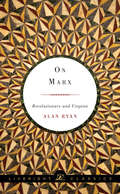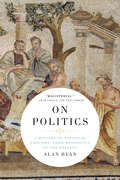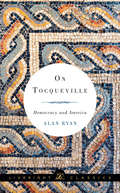- Table View
- List View
Semantics and the Body: Meaning from Frege to the Postmodern
by Horst RuthrofIn traditional semantics, the human body tends to be ignored in the process of constructing meaning. Horst Ruthrof argues, by contrast, that the body is an integral part of this hermeneutic activity. Strictly language-based theories, and theories which conflate formal and natural languages, run into problems when they describe how we communicate in cultural settings. Semantics and the Body proposes that language is no more than a symbolic grid which does not signify at all unless it is brought to life by non-linguistic signs.Ruthrof reviews and analyses various 'orthodox' theories of meaning, from the views of Gottlob Frege at the beginning of the twentieth century to those of theorists in the postmodern period, then offers an alternative approach of his own. His theory features 'corporeal semantics,' and holds that meaning has ultimately to do with the body and that the meaning of linguistic expressions is indeterminate without the aid of visual, tactile, olfactory, and other bodily signs. This approach also remedies what Ruthrof sees also as a loss of interpretive will in the postmodern era.Pedagogy in many fields could be enriched by a systemic integration of non-verbal semiosis into the linguistically dominated syllabus. Those involved in discourse analysis, literature, art criticism, film theory, pedagogy, and philosophy will find the implications of Ruthrof's study considerable.
Ezra Pound as Literary Critic (Critics of the Twentieth Century)
by Emeritus Professor Ruthven K. K. RuthvenBringing some of the insights of modern critical theory to bear on a great deal of information about Pound's activities as a literary critic (some of it made available only recently), K.K. Ruthven provides a provocative re-reading of a major modernist writer who dominated the discourse of modernism.
The Call of Character: Living a Life Worth Living
by Mari RutiShould we feel inadequate when we fail to be healthy, balanced, and well-adjusted? Is it realistic or even desirable to strive for such an existential equilibrium? Condemning our current cultural obsession with cheerfulness and "positive thinking," Mari Ruti calls for a resurrection of character that honors our more eccentric frequencies and argues that sometimes a tormented and anxiety-ridden life can also be rewarding. Ruti critiques the search for personal meaning and pragmatic attempts to normalize human beings' unruly and idiosyncratic natures. Exposing the tragic banality of a happy life commonly lived, she instead emphasizes the advantages of a lopsided life rich in passion and fortitude. She also shows what matters is not our ability to evade existential uncertainty but our courage to meet adversity in such a way that we do not become irrevocably broken. We are in danger of losing the capacity to cope with complexity, ambiguity, melancholia, disorientation, and disappointment, Ruti warns, leaving us feeling less "real" and less connected and unable to process a full range of emotions. Heeding the call of our character means acknowledging the marginalized, chaotic aspects of our being, and it is precisely these creative qualities that make us inimitable and irreplaceable.
The Ethics of Opting Out: Queer Theory's Defiant Subjects
by Mari RutiIn The Ethics of Opting Out, Mari Ruti provides an accessible yet theoretically rigorous account of the ideological divisions that have animated queer theory during the last decade, paying particular attention to the field's rejection of dominant neoliberal narratives of success, cheerfulness, and self-actualization. More specifically, she focuses on queer negativity in the work of Lee Edelman, Jack Halberstam, and Lynne Huffer, and on the rhetoric of bad feelings found in the work of Sara Ahmed, Lauren Berlant, David Eng, Heather Love, and José Muñoz. Ruti highlights the ways in which queer theory's desire to opt out of normative society rewrites ethical theory and practice in genuinely innovative ways at the same time as she resists turning antinormativity into a new norm. This wide-ranging and thoughtful book maps the parameters of contemporary queer theory in order to rethink the foundational assumptions of the field.
Penis Envy and Other Bad Feelings: The Emotional Costs of Everyday Life
by Mari RutiMari Ruti combines theoretical reflection, cultural critique, feminist politics, and personal experience to analyze the prevalence of bad feelings in contemporary everyday life. Proceeding from a playful engagement with Freud’s idea of penis envy, Ruti’s autotheoretical commentary fans out to a broader consideration of neoliberal pragmatism. She focuses on the emphasis on good performance, high productivity, constant self-improvement, and relentless cheerfulness that characterizes present-day Western society. Revealing the treacherousness of our fantasies of the good life, particularly the idea that our efforts will eventually be rewarded—that things will eventually get better—Ruti demystifies the false hope that often causes us to tolerate an unbearable present.Theoretically rigorous and lucidly written, Penis Envy and Other Bad Feelings is a trenchant critique of contemporary gender relations. Refuting the idea that we live in a postfeminist world where gender inequalities have been transcended, Ruti describes how neoliberal heteropatriarchy has transformed itself in subtle and stealthy, and therefore all the more insidious, ways. Mobilizing Michel Foucault’s concept of biopolitics, Jacques Lacan’s account of desire, and Lauren Berlant’s notion of cruel optimism, she analyzes the rationalization of intimacy, the persistence of gender stereotypes, and the pornification of heterosexual culture. Ruti shines a spotlight on the depression, anxiety, frustration, and disenchantment that frequently lie beneath our society’s sugarcoated mythologies of self-fulfillment, romantic satisfaction, and professional success, speaking to all who are concerned about the emotional costs of the pressure-cooker ethos of our age.
The Summons of Love
by Mari RutiWe are conditioned to think that love heals wounds, makes us happy, and gives our lives meaning. When the opposite occurs and love causes fracturing, disenchantment, and existential turmoil, we suffer deeply, especially if we feel that love has failed us or that we have failed to experience what others seem so effortlessly to enjoy. In this eloquently argued, psychologically informed book, Mari Ruti portrays love as a much more complex, multifaceted phenomenon than we tend to appreciate—an experience that helps us encounter the depths of human existence. Love's ruptures are as important as its triumphs, and sometimes love succeeds because it fails. At the heart of Ruti's argument is a meditation on interpersonal ethics that acknowledges the inherent opacity of human interiority and the difficulty of taking responsibility for what we cannot fully understand. Yet the fact that humans are often irrational in love does not absolve us of ethical accountability. In Ruti's view, we must work harder to map the unconscious patterns motivating our romantic behavior. As opposed to popular spiritual approaches urging us to live fully in the now, Ruti treats the past as a living component of the present. Only when we catch ourselves at those moments when the past speaks in the present can we keep ourselves from hurting the ones we love. Equally important, Ruti emphasizes transcending our individual histories of pain, an act that allows us to face the unconscious demons that dictate our relational choices. Written with substance and compassion, The Summons of Love restores the enlivening and transformative possibilities of romance.
Sapientia Astrologica: I. Medieval Structures (1250-1500): Conceptual, Institutional, Socio-Political, Theologico-Religious and Cultural (Archimedes #55)
by H Darrel RutkinThis book explores the changing perspective of astrology from the Middle Ages to the Early Modern Era. It introduces a framework for understanding both its former centrality and its later removal from legitimate knowledge and practice. The discussion reconstructs the changing roles of astrology in Western science, theology, and culture from 1250 to 1500. The author considers both the how and the why. He analyzes and integrates a broad range of sources. This analysis shows that the history of astrology—in particular, the story of the protracted criticism and ultimate removal of astrology from the realm of legitimate knowledge and practice—is crucial for fully understanding the transition from premodern Aristotelian-Ptolemaic natural philosophy to modern Newtonian science. This removal, the author argues, was neither obvious nor unproblematic. Astrology was not some sort of magical nebulous hodge-podge of beliefs. Rather, astrology emerged in the 13th century as a richly mathematical system that served to integrate astronomy and natural philosophy, precisely the aim of the “New Science” of the 17th century. As such, it becomes a fundamentally important historical question to determine why this promising astrological synthesis was rejected in favor of a rather different mathematical natural philosophy—and one with a very different causal structure than Aristotle's.
Hegel on the Modern Arts
by Benjamin RutterDebates over the 'end of art' have tended to obscure Hegel's work on the arts themselves. Benjamin Rutter opens this study with a defence of art's indispensability to Hegel's conception of modernity; he then seeks to reorient discussion toward the distinctive values of painting, poetry, and the novel. Working carefully through Hegel's four lecture series on aesthetics, he identifies the expressive possibilities particular to each medium. Thus, Dutch genre scenes animate the everyday with an appearance of vitality; metaphor frees language from prose; and Goethe's lyrics revive the banal routines of love with imagination and wit. Rutter's important study reconstructs Hegel's view not only of modern art but of modern life and will appeal to philosophers, literary theorists, and art historians alike.
Modal Empiricism: Interpreting Science Without Scientific Realism (Synthese Library #440)
by Quentin RuyantThis book proposes a novel position in the debate on scientific realism: Modal Empiricism. Modal empiricism is the view that the aim of science is to provide theories that correctly delimit, in a unified way, the range of experiences that are naturally possible given our position in the world. The view is associated with a pragmatic account of scientific representation and an original notion of situated modalities, together with an inductive epistemology for modalities. It purports to provide a faithful account of scientific practice and of its impressive achievements, and defuses the main motivations for scientific realism. More generally, Modal Empiricism purports to be the precise articulation of a pragmatist stance towards science.This book is of interest to any philosopher involved in the debate on scientific realism, or interested in how to properly understand the content, aim and achievements of science.
Neofinalism
by Raymond Ruyer Alyosha EdlebiRaymond Ruyer was a post-WWII French philosopher whose works and ideas were significant influences on major thinkers. With the publication of this translation of 'Neofinalism,' English-language readers can see at last how this seminal mind allied philosophy with science.
Neofinalism
by Raymond Ruyer Alyosha RuyerAlthough little known today, Raymond Ruyer was a post-World War II French philosopher whose works and ideas were significant influences on major thinkers, including Deleuze, Guattari, and Simondon. With the publication of this translation of Neofinalism, considered by many to be Ruyer's magnum opus, English-language readers can see at last how this seminal mind allied philosophy with science.Unfazed by the idea of philosophy ending where science began, Ruyer elaborated a singular, nearly unclassifiable metaphysics and reactivated philosophy's capacity to reflect on its canonical questions: What exists? How are we to account for life? What is the status of subjectivity? And how is freedom possible? HaNeofinalism offers a systematic and lucidly argued treatise that deploys the innovative concepts of self-survey, form, and absolute surface to shape a theory of the virtual and the transspatial. It also makes a compelling plea for a renewed appreciation of the creative activity that organizes spatiotemporal structures and makes possible the emergence of real beings in a dynamic universe.
The Repentant Abelard
by Juanita Feros RuysThe Repentant Abelard is both an innovative study and English translation of the late poetic works of controversial medieval philosopher and logician Peter Abelard, written for his beloved wife Heloise and son Astralabe. This study brings to life long overlooked works of this great thinker with analyses and comprehensive notes.
The Philosophy of Play
by Emily Ryall Wendy Russell Malcolm MacLeanPlay is a vital component of the social life and well-being of both children and adults. This book examines the concept of play and considers a variety of the related philosophical issues. It also includes meta-analyses from a range of philosophers and theorists, as well as an exploration of some key applied ethical considerations. The main objective of The Philosophy of Play is to provide a richer understanding of the concept and nature of play and its relation to human life and values, and to build disciplinary and paradigmatic bridges between scholars of philosophy and scholars of play. Including specific chapters dedicated to children and play, and exploring the work of key thinkers such as Plato, Sartre, Wittgenstein, Gadamer, Deleuze and Nietzsche, this book is invaluable reading for any advanced student, researcher or practitioner with an interest in education, playwork, leisure studies, applied ethics or the philosophy of sport.
The Philosophy of Play as Life
by Emily Ryall Wendy Russell Malcolm MacLeanIt is now widely acknowledged that play is central to our lives. As a phenomenon, play poses important questions of reality, subjectivity, competition, inclusion and exclusion. This international collection is the third in a series of books (including The Philosophy of Play and Philosophical Perspectives on Play) that aims to build paradigmatic bridges between scholars of philosophy and scholars of play. Divided into four sections (Play as Life, Play as Games, Play as Art and Play as Politics), this book sheds new light on the significance of play for both children and adults in a variety of cultural settings. Its chapters encompass a range of philosophical areas of enquiry such as metaphysics, aesthetics and ethics, and the spectrum of topics explored includes games, jokes, sport and our social relationship with the Internet. With contributions from established and emerging scholars from around the world, The Philosophy of Play as Life is fascinating reading for all those with an interest in playwork, the ethics and philosophy of sport, childhood studies or the philosophy of education.
A Copernican Critique of Kantian Idealism
by J. T. W. RyallThis book offers a comprehensive critique of the Kantian principle that 'objects conform to our cognition' from the perspective of a Copernican world-view which stands diametrically opposed to Kant's because founded on the principle that our cognition conforms to objects. Concerning both Kant's ontological denial in respect of space and time and his equivalence thesis in respect of 'experience' and 'objectivity', Ryall argues that Kant's transcendental idealism signally fails to account for the one thing that is essential for Copernicus and the only thing that would validate a comparison between his and Kant's critical philosophy, namely the subject as 'revolving object'. It is only by presupposing - in a transcendentally realistic sense - that human beings exist as physical things in themselves, therefore, that the 'observer motion' of Copernican theory is vindicated and the distorted nature of our empirical observations explained. In broadly accessible prose and by directly challenging the arguments of many stalwart defenders of Kant including Norman Kemp Smith, Henry E. Allison and Michael Friedman, Ryall's book will be of interest to both scholars and students of Kant's philosophy alike.
J.S. Mill (Routledge Revivals)
by Alan RyanFirst published in 1974. As logician, economist, political theorist, practical politician and active champion of social freedom, John Stuart Mill is a figure of continuing importance. In this book the author does full justice to the range of Mill’s achievements, providing an introductory guide to his most important and best known writings including Autobiography, A System of Logic, Utilitarianism, Liberty, and The Subjugation of Women. In their treatment of his works, the author seeks to emphasise Mill’s approach to those issues — education, the conflict between social order and individual freedom, the unresolved state of the social sciences, rights and duties of citizens in a democratic state — which remain most alive to us today. At the same time Mill is seen as part of his own age, responding to the anxieties that beset his contemporaries. This book will be of interest to students of politics and philosophy.
The Making of Modern Liberalism
by Alan RyanOne of the world's leading political thinkers explores the history, nature, and prospects of the liberal traditionThe Making of Modern Liberalism is a deep and wide-ranging exploration of the origins and nature of liberalism from the Enlightenment through its triumphs and setbacks in the twentieth century and beyond. The book is the fruit of the more than four decades during which Alan Ryan, one of the world's leading political thinkers, reflected on the past of the liberal tradition—and worried about its future.This is essential reading for anyone interested in political theory or the history of liberalism.
On Aristotle: Saving Politics from Philosophy (Liveright Classics)
by Alan RyanAn essential, comprehensive, and accessible guide to the life and works of Aristotle. In On Aristotle: Saving Politics from Philosophy, Alan Ryan examines Plato's most famous student and sharpest critic, whose writing has helped shape over two millennia of Western philosophy, science, and religion. The first thinker to posit that a society should be ruled by laws and not men, Aristotle was born in Stagira, Macedon, in 384 BCE. He would go on to join Plato's Academy and eventually become tutor to Alexander the Great. During his lifetime he would see the revival of Athens following its destruction in the Peloponnesian War, before the ultimate extinction of its radical form of democracy after the Macedonian conquest. Aristotle's strongly empirical cast of mind was brought to bear on a stunning range of subjects, from rhetoric to physics, from the history of political institutions and mathematics to zoology and botany. The resulting system dominated European thought from the thirteenth to seventeenth centuries. In Nicomachean Ethics and Politics--both excerpted here--Aristotle attempted to delineate the ideal virtues of a both public and private life as well as critique the utopian antipolitics of his former teacher, Plato. For Aristotle, life in a polis was the natural state of man and provided the greatest opportunity for human beings to fulfill their potential. Unlike his scientific theories, which would eventually be displaced by Galileo, Newton, and Darwin, Aristotle's meticulous thinking on the nature of human affairs, ethics, politics, citizenship, and virtue in a civil society remains as vital today as it was in his own time.
On Augustine: The Two Cities (Liveright Classics)
by Alan RyanNo philosopher speaks more immediately to the excesses of our twenty-first-century world and the limits of human reason than Augustine. It would be almost impossible to exaggerate the influence of Augustine--the once-hedonistic pagan turned ascetic theologian and defender of the early Christian Church--over all the subsequent history of Europe. Augustine 's political philosophy is pregnant with arguments that racked not only Christian Europe but also much of the modern world. Whether it was his essential skepticism about the value of earthly politics when contrasted with eternity, the role of a Christian within the State, or the nature of just war and the folly of imperial ambitions, Augustine articulated distinctive and long-lived thoughts on controversial subjects that remain embedded in our political discourse. In On Augustine: The Two Cities Alan Ryan carefully lays out the complicated political, philosophical, and religious context of Augustine and traces the history of his impact on Western thought both within and beyond the Christian tradition. Excerpted here are: The City of God, Confessions.
On Hobbes: Escaping the War of All Against All (Liveright Classics)
by Alan RyanA guiding light to America's Founding Fathers, Hobbes created the first truly modern political philosophy. In Leviathan, one of the greatest works of political philosophy of all time, English philosopher Thomas Hobbes created the idea of a "social contract" and set out to explicate a doctrine for the foundation of states and legitimate forms of government. In On Hobbes, Alan Ryan explains how Hobbes created the secular conception of the state and politics in one of the first truly modern works of political philosophy. Inverting Aristotle's view of politics, Hobbes argued that humans organize themselves into political communities not out of any sociable impulse to pursue the good life in common, but rather out of an unsociable fear of one another and for the sake of avoiding the greatest evil of all: death. Ryan explicates how modern notions of individual rights, sovereignty, representative government, and almost all liberal political theory find their foundation in the work of Hobbes. Excerpted here are: Leviathan, The Elements of Law.
On Machiavelli: The Search for Glory (Liveright Classics)
by Alan RyanAn essential, comprehensive, and accessible guide to the life and works of Machiavelli. In On Machiavelli: The Search for Glory, Alan Ryan illuminates the political and philosophical complexities of the often-reviled godfather of realpolitik. Thought by some to be the founder of Italian nationalism, regarded by others to be a reviver of the Roman Republic as a model for the modern Western world, Machiavelli remains a contentious figure. Often outraging popular opinion with his insistence on the amoral nature of power, Machiavelli eschewed the world as it ought to be in favor of a forthright appraisal of the one that is. Perhaps more than any other thinker, Machiavelli has suffered from being taken out of context, and Ryan places him squarely within his own time and the politics of a Renaissance Italy riven by near-constant warfare among rival city-states and the papacy. A well-educated son of Florence, Machiavelli was originally in charge of the Florentine Republic's militia, but in 1512 the city fell to papal forces led by Cardinal Giovanni de Medici, who thus restored the Medici family to power. Machiavelli was accused of conspiracy, imprisoned, tortured, and eventually exiled from his beloved Florence, and it was during this period that he produced his most famous works. While attempting to ingratiate himself to the Medicis, the historically minded Machiavelli looked to the imperial ambitions and past glories of the Roman Republic as a contrast to the perceived failures of his contemporaries. For Machiavelli, the hunger for power and glory was inextricable from human nature, and any serious attempt to rule must take this into account. In his revolutionary The Prince and Discourses--both excerpted here--Machiavelli created the first truly modern analysis of power.
On Marx: Revolutionary and Utopian (Liveright Classics)
by Alan RyanA lucid introduction to the philosophical complexities and the practical limits of the political thought of Karl Marx. When Karl Marx was buried at Highgate Cemetery in North London in 1883, his longtime friend and collaborator, Friedrich Engels, remarked that he was "above all a revolutionary." For Marx, the struggle to accurately describe or interpret the world in rational terms was not enough; the point of politics and philosophy was not to diagnose human society but to change it. According to Marx, history was defined by class conflict, with the state heretofore existing as a medium through which the ruling classes can exploit the labor of the productive classes. Only through revolution could true self-government be achieved with the ultimate goal of achieving a stateless, self-administering society free of coercive law, police, and military forces. Marx spent most of his adult life dedicated to uniting the radical working-class movements of Europe around this central idea. In On Marx, Alan Ryan examines Marx's political and economic philosophy within the Victorian context of Marx's own life and times as well as glancing forward to the uses and abuses of his ideas by his many successors. Tracing Marx's influences from Hegel to Feuerbach, from French socialism to British political economy, and documenting his ideological battles with his contemporaries, Ryan provides a sterling explication and critique of Marx's theories of alienation, surplus value, class struggle, and revolution. Situating Marx into the framework of everyday politics is never easy, but this one volume provides the clearest, most accessible introduction to Marx's theories in recent years. On Marx: Revolutionary and Utopian features: * a chronology of Karl Marx's life * an introduction and text by Alan Ryan that provides crucial context and cogent analysis * key excerpts from: "Notes on James Mill," The German Ideology, "Theses on Feuerbach," The Communist Manifesto, Capital, The Civil War in France, and Critique of the Gotha Program
On Politics: From Herodotus to the Present (Liveright Classics Ser. #0)
by Alan RyanThree decades in the making, one of the most ambitious and comprehensive histories of political philosophy in nearly a century. Both a history and an examination of human thought and behavior spanning three thousand years, On Politics thrillingly traces the origins of political philosophy from the ancient Greeks to Machiavelli in Book I and from Hobbes to the present age in Book II. Whether examining Lord Acton's dictum that "absolute power corrupts absolutely" or explicating John Stuart Mill's contention that it is "better to be a human dissatisfied than a pig satisfied," Alan Ryan evokes the lives and minds of our greatest thinkers in a way that makes reading about them a transcendent experience. Whether writing about Plato or Augustine, de Toqueville or Thomas Jefferson, Ryan brings a wisdom to his text that illuminates John Dewey's belief that the role of philosophy is less to see truth than to enhance experience. With this unparalleled tour de force, Ryan emerges in his own right as one of the most influential political philosophers of our time.
On Tocqueville: Democracy and America (Liveright Classics)
by Alan RyanTocqueville's gifts as an observer and commentator on American life and democracy are brought to vivid life in this splendid volume. In On Tocqueville, Alan Ryan brilliantly illuminates the observations of the French sociologist Alexis de Tocqueville, who first journeyed to the United States in 1831 and went on to catalog the unique features of the American social contract in his two-volume masterpiece, Democracy in America. Often thought of as the father of "American Exceptionalism," Tocqueville sought to observe the social conditions of emerging political equality in America, "a river that may be channeled but cannot be stopped in its course." In choosing America, he posed a central question of how a moderate, stable, and constitutional government is to be maintained in the wake of a revolution. As a dispassionate visitor, Tocqueville wanted to discover the social, moral, and economic arrangements that made liberty and self-government possible. In doing so, Tocqueville made a number of prescient observations about American life--whether it be the contrast between equality and liberty or Americans' belief that they all belong to the middle class--that remain as relevant today as when they were first written. While Tocqueville is often praised by both conservatives and liberals, either for his distrust of big government and fondness for decentralized power or for his concern with association and community, both tend to overlook his contempt for the "coarse appearance" of the individual members of Congress as well as his enthusiasm for the brutal nature of our prison system. Alan Ryan examines the often complicated and elusive Democracy in America, tracing the influence of writers such as Rousseau, Montesquieu, and Guizot, and explaining Tocqueville's original conceptions of equality and individualism within their historical context. In Ryan's hands, On Tocqueville becomes the perfect introduction and guide to Democracy in America. On Tocqueville: Democracy and America features: * a chronology of Alexis de Tocqueville's life * an introduction and text by Alan Ryan that provides crucial context and cogent analysis * key excerpts from Democracy in America
